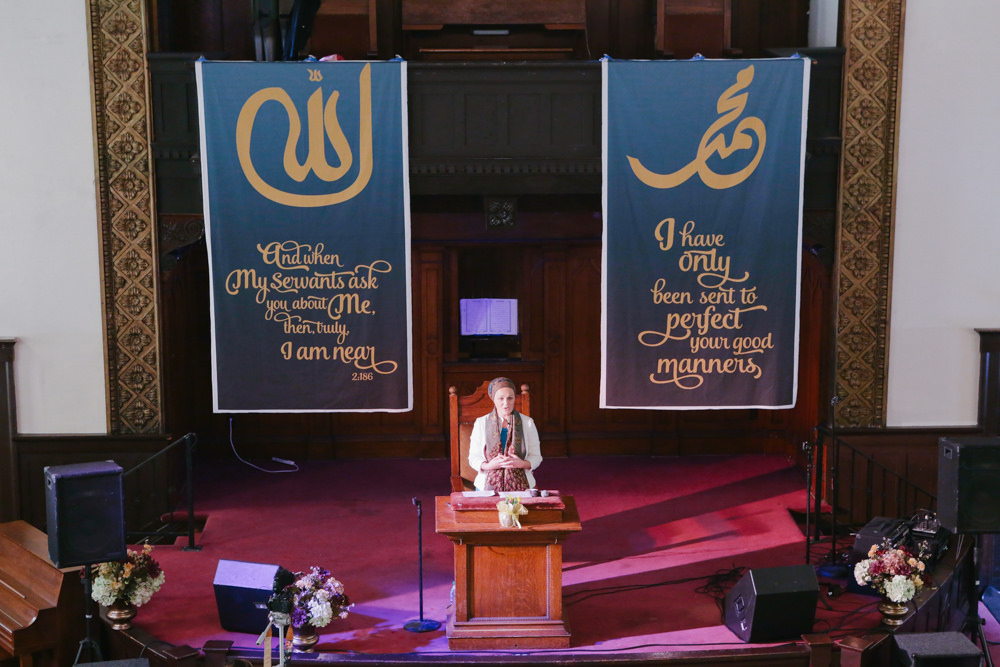Turning points have a way of finding you when you least expect them. For most of my adult life, I’d been running away from serving as a spokesperson for or an expert of Muslim women. Women’s issues always felt like the sideshow in the American Muslim conversation, and I wanted to be on the main stage. This past year, however, I have found myself where I least expected — seeking out opportunities to speak up for and actively support the enrichment of women and girls.
When Boko Haram kidnapped hundreds of schoolgirls last spring, I was six months pregnant and could think of nothing else but the girls’ mothers and the anguish they must be feeling for their dear daughters. While offering prayers at an interfaith #BringBackOurGirls vigil, I felt my belly rub up against the podium repeatedly and was overcome with emotion at the thought of those girls being robbed of their freedom and future, and how this threat faces all women and girls to varying degrees.
One year later, I find myself with two profound gifts whose arrival I can’t help but believe are interconnected — my daughter, and being the first woman to give a sermon at The Women’s Mosque of America.
I heard about the idea of a women’s mosque last summer when I ran into founder Hasna Maznavi at a Ramadan iftar (fast breaking dinner), and was thrilled with her plans to create an inclusive space to nurture the spiritual and social needs of females– the kind of space I wished I had had growing up. I never expected I would get a call a few months later asking me to be the understudy to the woman who had agreed to give the inaugural khutba (sermon) at the Women’s Mosque. It turned out that I would have to make good on my promise when the speaker was not able to travel to L.A. after all.
Giving that first sermon was one of the most powerful experiences of my life. If you watch the video of my khutba, you’re likely to hear two things right away: my voice shaking at the beginning and my baby girl crying in the background. My voice was quivering because I had just heard a woman perform the adhan (call to prayer) for the first time, and it sounded so fresh to my ears that my eyes filled with tears. As I stepped up to the podium and began to speak, I heard Gandhi’s magnificent words ringing in my ears: “Speak the truth, even if your voice shakes,” and I smiled.
I shared my story and spoke about our collective responsibility as Muslim women to help ourselves, our mosques, and our zones of influence with our faith and our diverse talents. I quoted my favorite verse from the Quran: “Go forth, whether you be equipped lightly or heavily, and strive and struggle with your lives and your possessions, in the cause of God. That is best for you, if you but knew” (Quran 9:13).
Standing at the podium before more than 150 Muslim women and supporters, I knew I may not be the best equipped, but that I could do this and that my speech would make it easier for the next woman to step outside of her comfort zone to uplift other women. Dr. Rose Aslan, who was sitting in the audience that day, did exactly that by volunteering to give the second khutba. Each month since, I have heard sermons that have touched my soul in ways I rarely experienced in a co-ed mosque.
It’s painful to admit, but I have not enjoyed or felt tied to the ritual of prayer in recent years. Instead, I have found my deepest spiritual connection in serving others, but somehow praying alongside other women at the Women’s Mosque reignited a flame of connection and tranquility I had not felt in a long time. Surrounded by women, led in prayer by a woman, saying “Ameen” out loud in a chorus with women, and ending the prayer with a sweet “salaam alaykum” (peace be upon you) to the women on my right and my left—there was something special about it all. Sometimes, the things you take for granted can take on a new life when done a little differently. So, this Ramadan, I have re-committed myself to making all five of my daily prayers.
When my husband and I were expecting our son a few years ago, we agreed, “We’ve got to raise a good man because the world needs more good men.” This time around, when we learned we were expecting a girl, we agreed our task would be even bigger. “We’ve got to fix the world,” we told ourselves, so that she can live her life on a level playing field.
I’m proud to be surrounded by American Muslim women who are center stage, telling our stories, creating positive spaces, working for justice, and serving the greater good. It is this history in the making that makes me believe we might just be able to make good on our prayers for all of our daughters.
[separator type=”thin”]
Edina Lekovic is Director of Community Outreach for The Women’s Mosque of America, a consultant with the Muslim Public Affairs Council, and a board member of NewGround: A Muslim-Jewish Partnership for Change.
Photo: mahinspring2012
See Rose Aslan’s Khutbah here:






I am so proud of you, Edina Lekovic, for your leadership in The Women’s Mosque of America in Los Angeles. The visit to the Fresno mosque for prayers yesterday illustrated the dire need to have a serious intra-Muslim discussion on the leadership role of women in Islamic institutions, facilities allocated for women, etc.
1. why must the word Muhammad be hanged along side Allah? are the two at par?
2. dare to differ from the mainstream yet dare not reveal the hair as what Quranists understand not part of the Aurat?